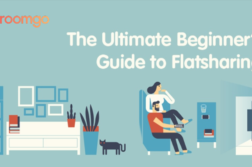No matter where you’re moving from – New York or Nantes, Capetown or Caracas – the terminology of the UK flatshare can be tricky to navigate and can leave you feeling a little lost in translation. Here are some common terms and definitions to help you in your search…
Find the newest rooms available in the London, Bristol, Manchester, Bournemouth, Oxford
Room options in the UK
Single room
A single room is a room with enough space for a double bed.
Double room
There is some uncertainty with this term because for some, double room implies you need to share with someone. That’s not the case: While a double room may not come kitted out with a double bed, it means that there is enough space for one.
Shared room
You’ll be sharing your bedroom and communal space with another person. This is reportedly on the rise due to London’s rental price escalations, making up over 10 per cent of the market.
Ensuite
An ensuite room refers to a room with bathroom and toilet facilities inside it.
UK housing options
In the UK you will find several housing options. Get to know some of the most common terms and what they mena
An abbreviation of ‘bed sitting room,’ bedsit refers to a small self-contained unit with a bedroom and living space in one. As a general rule, expect to share your kitchen/bathroom with others in the building.
A flat in which your bedroom and living room are the same space and you also have your own bathroom and kitchen facilities (the kitchen is often in the main living area). More spacious than a bedsit, these flats also tend to be more expensive.
A flat is a separate, self-contained premises that occupies only part of a building and is found in converted houses or purpose-built buildings. In the U.S., flats are known as apartments.
A property that typically consists of a ground floor and at least one other that is designed for accommodation and may be split into multiple flats.
A loft is an open-plan apartment known for having high ceilings and good light.
A flat occupying two or more floors of a larger building, often with its own front door at street level.
In London terms, mansions refer to purpose-built flats with high ceilings.
Traditionally rows of stables, mews have been converted into residential properties which often have garages and a communal outside space.
A conversion is a house that has been divided into two or more flats.
A house that is completely separate from its neighbours.
Often refers to purpose-built flats in London that were formerly owned by the council.
A flat with a garden/outdoor space.
A self-contained accommodation (usually with its own front door) connected to the main living quarters of a house.
A house in a row of identical properties connected to each other by shared (aka party) walls.
UK living arrangements
Room/House/Flatshare:
A house or flatshare refers to a space where people reside in the same private residence and share facilities like the bathroom, kitchen and living room (as well as appliances like the washing machine and TV), but typically have their own bedrooms. This type of arrangement usually involves a shared responsibility for bills and council tax for the property.
Flatmate/Roommate/Housemate:
Terms used to describe the person who shares your flat or house with you; roommate is the American lingo, which can also be used to describe someone sharing your room.
Sharers
Sharer is another term which refers to those who share accommodation together.
Read also:
>>> What is DSS
>>>> The Ultimate Beginner’s Guide to Flatsharing
Important flatshare terms in the UK
No idea what council tax, tenancy break clause or Assured fixed-term tenancy means? We explain 🙂
Short term
A short-term stay is a flexible period lasting longer than one week. These agreements tend to be more expensive and less flexible than longer-term stays.
Monday-Friday/Fractional lets
The lodger occupies the room during the week and lives elsewhere at the weekends – a convenient choice for those with a short-term work contract that bases them somewhere other than where they live.
Long term:
Tenancies between six months and a year are referred to as long term.
Assured fixed-term tenancy
The most common form of tenancy agreement in the UK, this refers to a tenancy lasting for a fixed period of at least six months. It explains the rights and responsibilities of tenants and landlords and gives you the right to remain in a property unless the landlord can convince a court there is good reason to evict you.
Deposit
A deposit is a fixed sum taken at the start of your tenancy by landlords or letting agents to cover damage, rent arrears, etc. A deposit is typically equal to six weeks’ rent.
Council tax
The local tax in England, Scotland and Wales, you pay your local council tax on top of rental costs to contribute to local police, waste collection and more. Fees vary from council to council.
Contents insurance
This is a policy to cover belongings like furniture, jewellery, etc from damage or theft. Room contents insurance also exists for those renting a room.
Tenancy deposit scheme
The TDS is a government scheme which safeguards deposits taken by landlords and protects your deposit in case of a dispute.
Tenant break clause
This clause sets of the circumstances in which a tenant can break their contract. A landlord break clause is also in place.
Administration fee
Tenants pay this charge to letting agents to cover the cost of the preparation of paperwork to let a property.
Find the newest rooms available on Roomgo
Photo credit @Alamy










